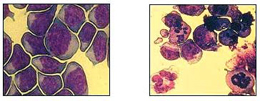| 2005 |

|
YEAR BOOK |
University College Dublin
|
Combating Cancer
|

However, despite these advances drug target identification and new drug design is limited due to an incomplete knowledge of the core cell death machinery. In the past decade research into cell death mechanisms has focussed on caspases, a family of cysteine proteases activated during apoptosis. In recent years however, increasing evidence of programmed cell death in the absence of caspase activity has led to the hypothesis that a variety of cell death programmes may be triggered in distinct circumstances and interdependence of these programmes is required in order to complete the cell death process. Triggering caspase-independent death pathways has become an attractive alternative approach to eradicating tumour cells although it is less well understood and many questions regarding the identity of pathway components remain unanswered. The existence of alternative cell death programmes implies novel therapeutic targets and biomarkers for disease diagnosis and classification.
Using a molecular biology and proteomic approach, we are investigating the involvement of novel apoptogenic proteins during caspase-independent apoptosis in a variety of human tumour cells including MCF-7 breast carcinoma cells and chronic myeloid leukaemia (CML) cells. Deciphering the molecular components of these alternative cascades will provide valuable information that is the key to the design of a new generation of targeted drugs.
This project is one example of the ongoing research carried out by an expansive network of Investigators in the Conway Institute on the basic and clinical biology of various types of cancer including leukaemia, breast, prostate, neuroblastoma and colon with the aim of translating this basic knowledge into clinical application.
Contact: Dr. Margaret Mc Gee, Department of Biochemistry,
Conway Institute of Biomolecular and Biomedical Research,
UCD, Belfield, Dublin 4;
Email: [email protected]; Web: http://www.ucd.ie/biochem/Margaret_McGee/ and http://www.ucd.ie/conway/